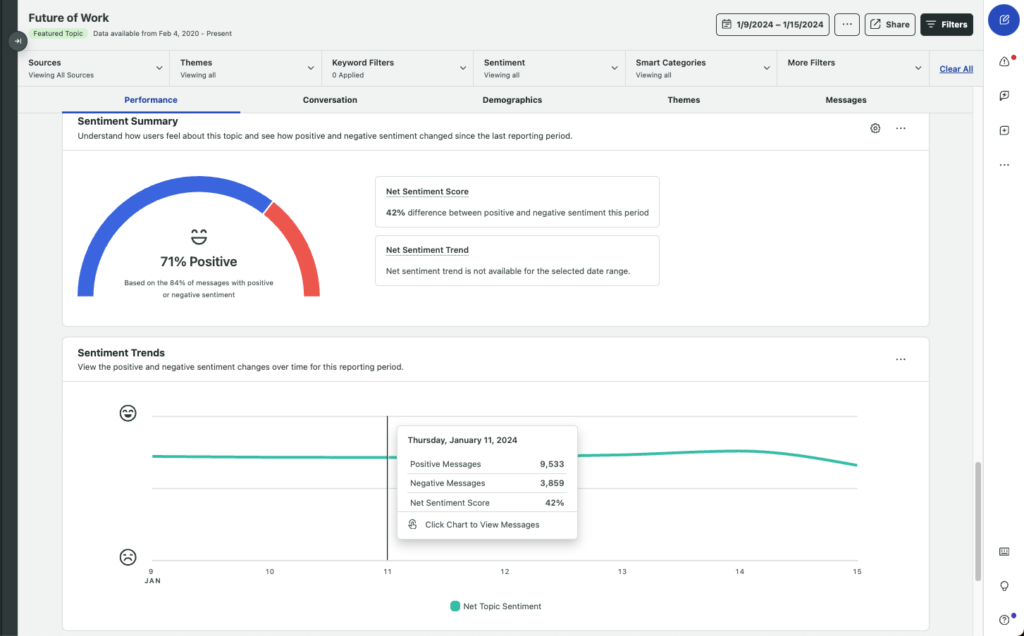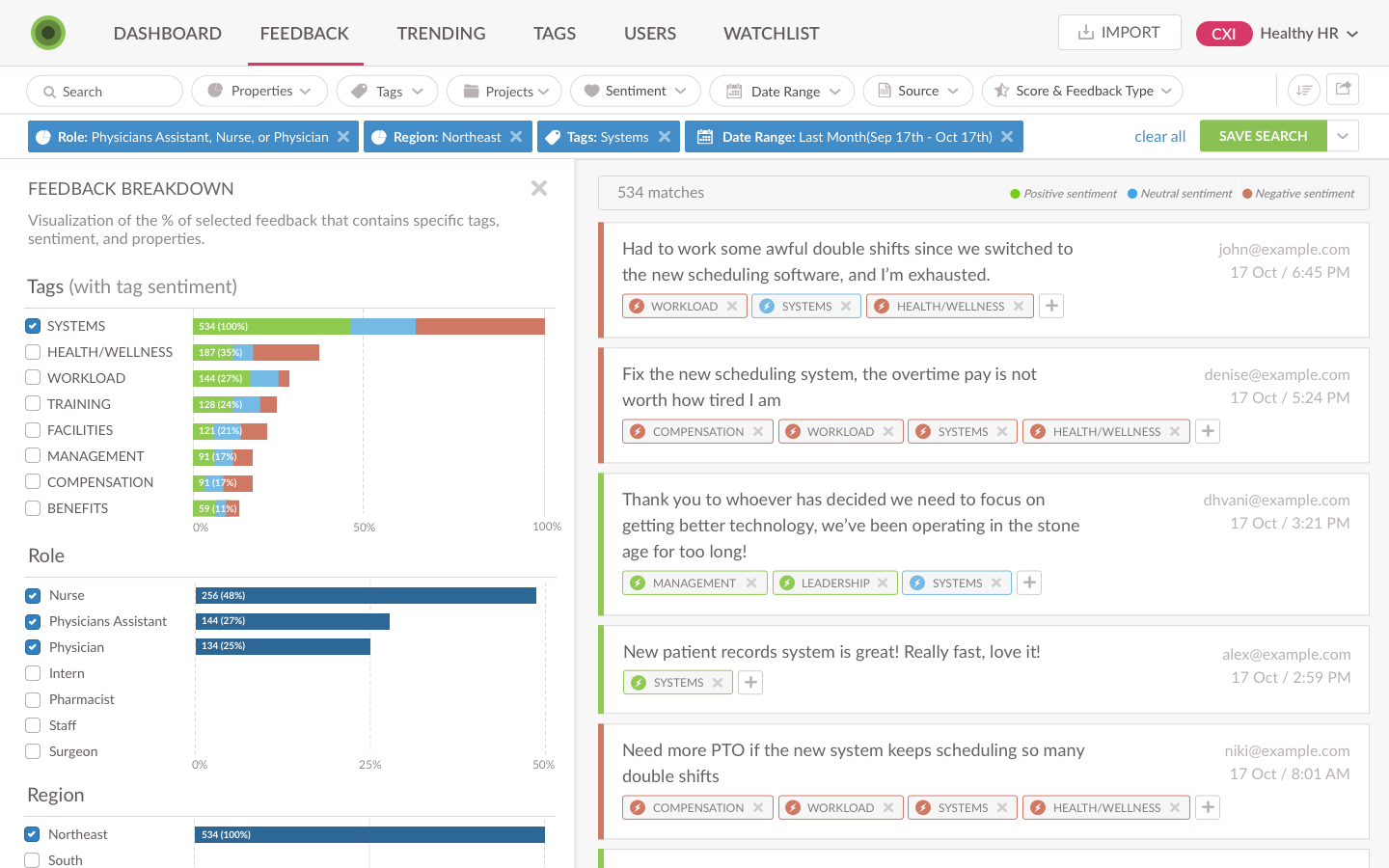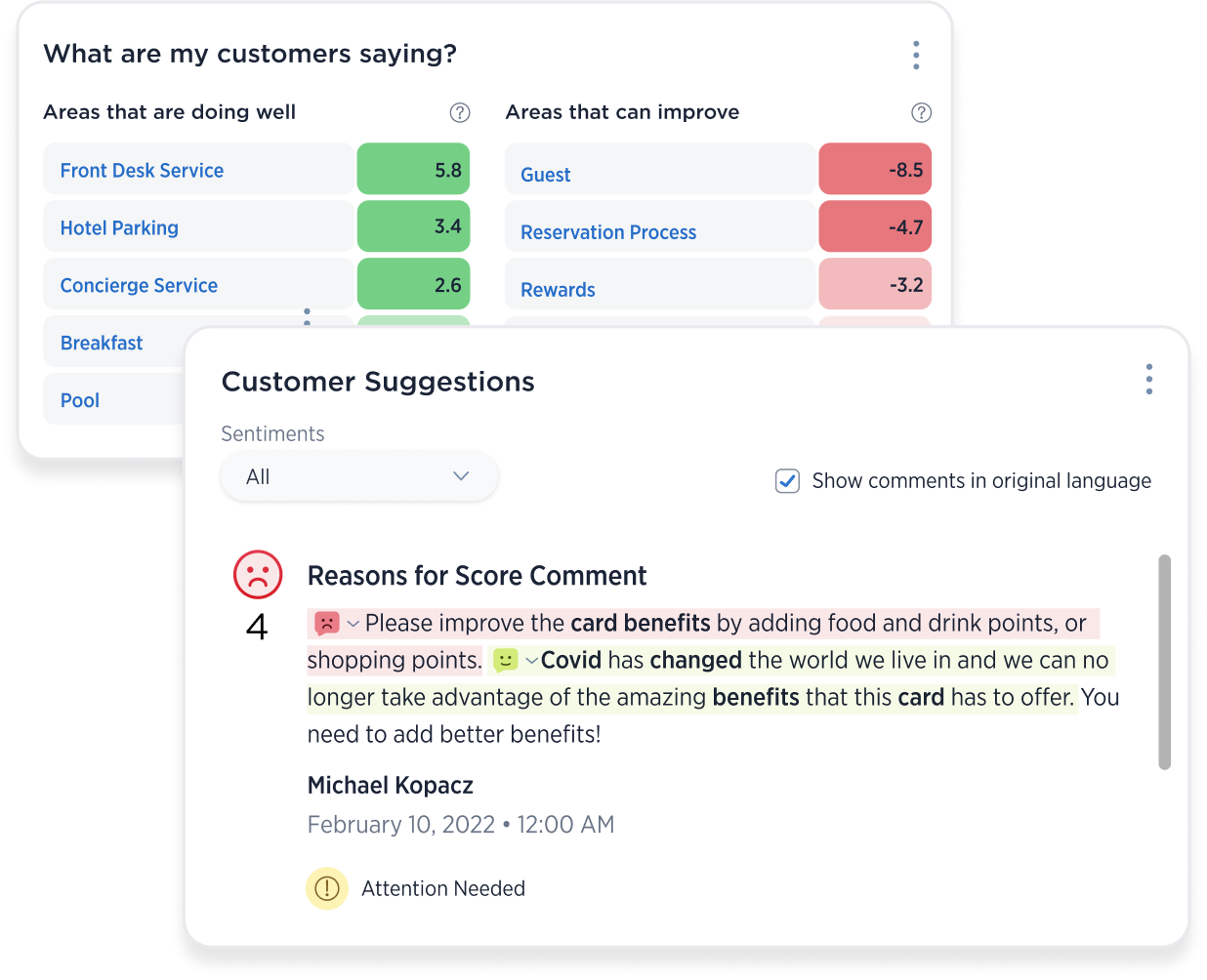Just like non-verbal cues in face-to-face communication, there’s human emotion weaved into the language your customers are using online.
Decoding those emotions and understanding how customers truly feel about your brand is what sentiment analysis is all about.
But tracking sentiment is no piece of cake.
We’re talking about analyzing thousands of conversations, brand mentions and reviews spread across multiple websites and platforms—some of them happening in real-time.
You need a sentiment analysis tool for the job.
In this post, you’ll find some of the best sentiment analysis tools to help you monitor and analyze customer sentiment around your brand.
What is a sentiment analysis tool?
A sentiment analysis tool uses artificial intelligence (AI) to analyze textual data and pick up on the emotions people are expressing, like joy, frustration or disappointment.
It leverages natural language processing (NLP) to understand the context behind social media posts, reviews and feedback—much like a human but at a much faster rate and larger scale.
Then, it calculates the average sentiment around your brand, classifying it as positive, negative or neutral. Some tools also help you monitor your competitors’ customer sentiment score.
Some sentiment analysis tools can also analyze video content and identify expressions by using facial and object recognition technology.
In the context of AI marketing, sentiment analysis tools help businesses gain insight into public perception, identify emerging trends, improve customer care and experience, and craft more targeted campaigns that resonate with buyers and drive business growth.
Applications of a sentiment analysis tool
Sentiment analysis tools are revolutionizing how businesses understand and respond to customers. Here are some specific ways brands can benefit from these tools:
- Social Listening: Keep an eye on customer opinions and reactions to brands, products, services, campaigns, events and trends on social media.
- Review Management: Analyze customer feedback across multiple platforms and respond promptly and empathetically to improve customer satisfaction.
- Competitive Analysis: Compare sentiment towards your brand with competitors to understand where you stand in terms of positioning and public perception.
- Brand Insights: Gather and interpret data on brand reputation, customer experience, and product strengths and weaknesses to develop a solid brand strategy.
- Opinion Mining: Analyze both customer and employee feedback to get a clear picture of your company’s performance and identify areas for improvement.
Full stack sentiment analysis tools
These tools can pull information from multiple sources and employ techniques like linear regression to detect fraud and authenticate data. They also run on proprietary AI technology, which makes them powerful, flexible and scalable for all kinds of businesses.
1. Sprout Social
Sprout Social offers all-in-one social media management solutions, including AI-powered listening and granular sentiment analysis.

Monitor millions of conversations happening in your industry across multiple platforms. Sprout’s AI can detect sentiment in complex sentences and even emojis, giving you an accurate picture of how customers truly think and feel about specific topics or brands.
View the average customer sentiment around your brand and track sentiment trends over time. Filter individual messages and posts by sentiment to respond quickly and effectively.
Sprout also supports multilingual sentiment analysis, which helps you understand and resonate with a diverse, international customer base. Access a full scope of data tagged and filtered by smart category, without changing your query, whether by people, place, product or more. Furthermore, our Queries by AI Assist feature generates keyword suggestions for Listening queries that can further enhance your analysis landscape
2. InMoment (Lexalytics)
InMoment is a customer experience platform that uses Lexalytics’ AI to analyze text from multiple sources and translate it into meaningful insights.

It supports over 30 languages and dialects, and can dig deep into surveys and reviews to find the sentiment, intent, effort and emotion behind the words.
3. Medallia
Medallia’s experience management platform offers powerful listening features that can pinpoint sentiment in text, speech and even video.

The platform excels in collecting and analyzing real-time feedback from multiple sources, including social media, surveys, reviews, SMS, emails, voice conversations and more.
4. Qualtrics (Clarabridge)
Qualtrics is an experience management platform that offers Text iQ—a sentiment analysis tool that leverages advanced NLP technology to analyze unstructured data from various sources, including social media, surveys and customer support interactions.

The tool can automatically categorize feedback into themes, making it easier to identify common trends and issues. It can also assign sentiment scores to quantifies emotions and and analyze text in multiple languages.
Social media sentiment analysis tools
Focusing specifically on social media platforms, these tools are designed to analyze sentiment expressed in tweets, posts and comments. They help businesses better understand their social media presence and how their audience feels about their brand.
5. Brandwatch
Brandwatch offers a suite of tools for social media research and management. Their listening tool helps you analyze sentiment along with tracking brand mentions and conversations across various social media platforms.

Classify sentiment in messages and posts as positive, negative or neutral, track changes in sentiment over time and view the overall sentiment score on your dashboard.
6. Buffer
Buffer offers easy-to-use social media management tools that help with publishing, analyzing performance and engagement.

One of the tool’s features is tagging the sentiment in posts as ‘negative, ‘question’ or ‘order’ so brands can sort through conversations, and plan and prioritize their responses.
7. Agorapulse
Agorapulse is another social media management software that specializes in publishing and organizing your inbox.
It offers basic sentiment analysis capabilities in that it lets you add labels like “positive” and “negative” to inbox items that contain specific words, such as “happy”, “great”, “bad” or “awful.”

Add labels to messages manually or use the Inbox Assistant to automatically go through your messages and label all relevant items that contain the specified keywords.
8. Awario
Awario is a specialized brand monitoring tool that helps you track mentions across various social media platforms and identify the sentiment in each comment, post or review.

You can track sentiment over time, prevent crises from escalating by prioritizing mentions with negative sentiment, compare sentiment with competitors and analyze reactions to campaigns.
News sentiment analysis tools
These tools specialize in monitoring and analyzing sentiment in news content. They use News APIs to mine data and provide insights into how the media portrays a brand or topic.
9. Aylien (Quantexa)
Aylien uses AI to monitor, organize and analyze sentiment in news content. This makes it a valuable tool for PR and communications teams to keep an eye on trends and monitor public opinion and perception about brands and topics.
A key feature of the tool is entity-level sentiment analysis, which determines the sentiment behind each individual entity discussed in a single news piece.
10. Cision Communication Cloud
Cision is an AI-powered PR platform with robust media monitoring capabilities.

Its features include sentiment analysis of news stories pulled from over 100 million sources in 96 languages, including global, national, regional, local, print and paywalled publications.
11. Meltwater
Meltwater’s AI-powered tools help you monitor trends and public opinion about your brand. Their sentiment analysis feature breaks down the tone of news content into positive, negative or neutral using deep-learning technology.

The tool can handle 242 languages, offering detailed sentiment analysis for 218 of them. This makes it versatile and useful for tracking global news sentiment.
Text sentiment analysis tools
These tools run on proprietary AI technology but don’t have a built-in source of data tapped via direct APIs, such as through partnerships with social media or news platforms.
12. MonkeyLearn
MonkeyLearn is a simple, straightforward text analysis tool that lets you organize, label and visualize data like customer feedback, surveys and more.

The tool uses AI to detect, categorize and track sentiment over time. You can use ready-made machine learning models or build and train your own without coding. MonkeyLearn also connects easily to apps and BI tools using SQL, API and native integrations.
13. Google NLP API
Google NLP API is a text analysis tool designed to extract insights and opinions from various documents, including emails, chats and social media, through entity and sentiment analysis.

It supports multimedia content by integrating with Speech-to-Text and Vision APIs to analyze audio files and scanned documents. Plus, its Translation API can analyze sentiment across multiple languages.
14. Amazon Comprehend
Amazon’s text analysis tool goes through documents, emails, social media and customer support tickets to uncover insights. It identifies key elements such as phrases, sentiment and topics, and even lets businesses train models to classify documents.

Moreover, it helps maintain data privacy and protects sensitive information by identifying and redacting Personally Identifiable Information (PII).
15. Microsoft Azure
Azure AI Language lets you build natural language processing applications with minimal machine learning expertise. Pinpoint key terms, analyze sentiment, summarize text and develop conversational interfaces.

The platform offers multilingual models that adapt across languages. Azure also maintains strict privacy standards by using text inputs exclusively for training models.
Use sentiment analysis tools to make data-driven decisions backed by AI
AI-powered sentiment analysis tools make it incredibly easy for businesses to understand and respond effectively to customer emotions and opinions.
While there are dozens of tools out there, Sprout Social stands out with its proprietary AI and advanced sentiment analysis and listening features. Try it for yourself with a free 30-day trial and transform customer sentiment into actionable insights for your brand.